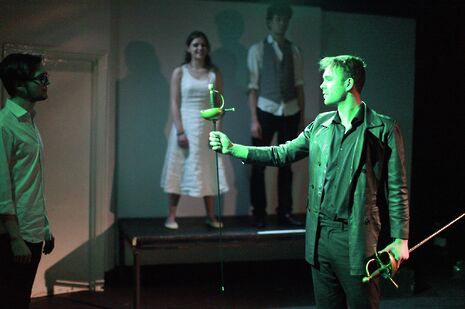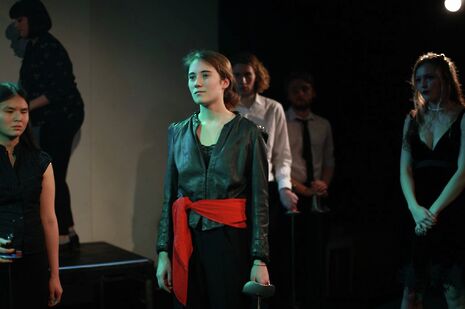After Juliet review: ‘frustratingly close to being good’
Rather than a rejuvenation of the Renaissance, After Juliet finds something new in the Bard’s most famous play, but this production doesn’t quite get it right

Verona, just days after the death of Romeo and Juliet. The Capulet family is mourning its lost lady, or so we suppose. In truth, Rosaline Capulet is mourning her lost lover, rather than her cousin, and the other women are not necessarily mourning either. The whole town is more concerned with the election of the new Prince, and whether the peace between the Capulets and Montague can or will last. The scene which greets the audience is obviously intended to evoke an image of quaint alleyways in Verona, with paintings on the walls of the Playroom which conjure an image of Renaissance Italy immediately. These were the only set pieces needed beyond a raised platform: Saffie Patel, assisted by Ellie Coverdale, did a good job in trusting the minimalism to let the art do the work, and the black platform’s multifunctionality was successful. Likewise, the costumes succeeded in being suitable for the setting and tone of the play; it can be difficult to characterise outfits when everyone is wearing mourning blacks, but Marie Allen succeeded in creating individual outfits for the women.
Beyond this, the production aspects were variable in effect. Some props – Valentine’s umbrella for example – were well used and added to the piece, but bringing several longswords onto the Corpus stage and actually trying to fight with them was not a wise decision. Lighting and sound were similarly hit and miss. The rain effect was good, until it lasted a few more scenes than necessary (or than made sense, once the action had moved inside), and the crypt sound effect would have added well to the atmosphere, had the silence between loops not broken it. The crypt lighting was more successful, and other changes were effective, but the lighting in other scenes was unnecessary.
The best effect was not actually not down to the tech team: the live guitar played by Freddie Bartlett-Evans both on and off stage was a really lovely touch, and it was soon clear that this was Romeo, still on Rosaline’s mind after his death. Having Romeo and Juliet haunt the stage worked well in some moments, but in others there seemed to be little impetus for their presence. In fact, there was little impetus for many of the events of the play, resulting in actors lacking conviction, seemingly as unsure of their characters’ motivations as the audience was. Several lines were delivered in questionable tones, or with jarring pacing problems. This can only be attributed to a lack of detail in direction: there were several instances in which the lines had not been thought-through or the motivation for them properly explored. Add to this some very clumsy scene transitions, and the fact that characters often had their backs to the audience for no reason, and the whole performance felt somewhat unpolished.

That said, some moments worked very nicely, and the scenes in which Rosaline bitterly addresses Juliet (who was clearly meant to be stood at Corpus corner) were well delivered by Mary Butler, while her suitor Benvolio was equally well executed by Jamie Sayers: it must be said that their scene in the crypt was the closest the performance got to an emotional exchange that felt genuine. Archie Williams must also be praised for his turn as Gianni, whose moments on stage outshone all others, and who was the only person that was completely convincing in his role. Unfortunately, the scenes between Gianni and Lorenzo add little to the play as a whole beyond light relief: drunken discussions about tea and tortoise sex are apparently the modern equivalent of Shakespeare’s fool parts. Nonetheless, Williams ensures that the audience looks forward to his appearance on stage, even if it means a break from the narrative.
This show was frustratingly close to being good, but the actors failed to convince me that they had faith in the script, and the whole piece lacked motivation or charisma. In fairness, this is a script which is particularly difficult to work with, stuck between wanting to uphold the tradition of Romeo and Juliet and to bring something new. As a result, it is pulled back and forth between archaisms and modern expletives, and the effect is one of an identity crisis rather than a rejuvenation of the Renaissance. The problem was that the performance amplified, rather than made up for this fact, making the overall effect – while admirable – somewhat disappointing.
After Juliet is on at the Corpus Playroom until 10 March
 News / Uni Scout and Guide Club affirms trans inclusion 12 December 2025
News / Uni Scout and Guide Club affirms trans inclusion 12 December 2025 News / Cambridge study finds students learn better with notes than AI13 December 2025
News / Cambridge study finds students learn better with notes than AI13 December 2025 News / Cambridge Vet School gets lifeline year to stay accredited28 November 2025
News / Cambridge Vet School gets lifeline year to stay accredited28 November 2025 Science / Did your ex trip on King’s Parade? The science behind the ‘ick’12 December 2025
Science / Did your ex trip on King’s Parade? The science behind the ‘ick’12 December 2025 News / Pembroke to convert listed office building into accom9 December 2025
News / Pembroke to convert listed office building into accom9 December 2025








